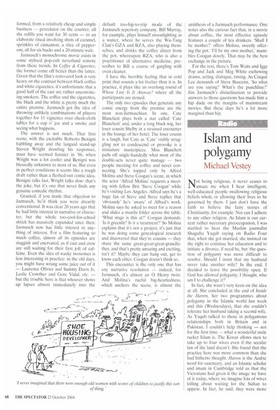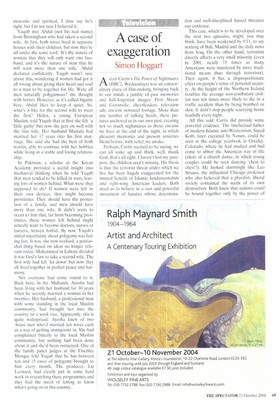Islam and polygamy
Michael Vestey
Not being religious, it never ceases to amaze me when I hear intelligent, well-educated people swallowing religious beliefs whole or allowing their lives to be governed by them. I just don't have the faith to believe the fairy stories of Christianity, for example. Nor can I adhere to any other religion. As Islam is our current rather necessary preoccupation, I was startled to hear the Muslim journalist Shagufta Yaqub saying on Radio Four that, when she got married, she insisted on the right to continue her education and to initiate a divorce, if need he, hut 'the question of polygamy was more difficult to resolve. Should I insist that my husband never take another wife? In the end, I decided to leave the possibility open. If God has allowed polygamy, I thought, who am Ito challenge it?'
In fact, she wasn't very keen on the idea at all. She concluded at the end of Inside the Harem, her two programmes about polygamy in the Islamic world last week and this (Wednesdays), that she couldn't tolerate her husband taking a second wife. As Yaqub talked to those in polygamous relationships both in Britain and in Pakistan, I couldn't help thinking — not for the first time — what a wonderful male racket Islam is. The Koran allows men to take up to four wives even if the secular law of the land doesn't. She found that the practice here was more common than she had hitherto thought. Harem is the Arabic word for sanctuary, and an Islamic scholar and imam in Cambridge told us that the Victorians had given it the image we have of it today, where we imagine lots of wives lolling about waiting for the Sultan to appear. In fact, he said, they were more
monastic and spiritual. I dare say he's right, but I'm not sure I believed it.
Yaqub met Abdul (not his real name) from Birmingham who had taken a second wife. At first, both wives lived in separate houses with their children, hut now they're all under the same roof, It's the nature of woman that they will only want one husband, and it's the nature of man that he will want more than one wife,' Abdul declared confidently. Yaqub wasn't sure about this, wondering if women had got it all wrong about giving their heart and soul to a man to be together for life. Were all men naturally polygamous'? she thought with horror. However, as it's called bigamy here, Abdul likes to keep it quiet. So, what's it like for the second wife to meet the first? Helen, a young European Muslim, told Yaqub that at first she felt 'a little guilty' but now she gets on well with the first wife. Her husband Mustafa had married her 17 years into his first marriage. She said she had the best of both worlds, able to continue with her hobbies while living in a stable and loving relationship.
In Pakistan, a scholar at the Koran Academy provided a useful insight into mediaeval thinking when he told Yaqub that men tended to be killed in wars, leaving lots of women behind. What were they supposed to do? If women were left to their own devices, they might become prostitutes. They should have the protection of a family, and men should have more than one wife. It didn't seem to occur to him that, far from becoming prostitutes, these women left behind might actually want to become doctors, nurses or lawyers, heaven forbid. By now Yaqub's initial uncertainty about polygamy was fading fast. It was, she now realised, a patriarchal thing based on ideas no longer relevant today. Mohammed in Lahore decided it was God's law to take a second wife. The first wife had felt 'let down' but now they all lived together in perfect peace and harmony.
Not everyone had come round to it. Back here, in the Midlands, Ayesha bad been living with her husband for 30 years when he secretly married a woman in her twenties. Her husband, a professional man with some standing in the local Muslim community, had brought her into the country on a work visa. Apparently, this is quite widespread. Ayesha knew of two Asian men who'd married ten wives each as a way of getting immigrants in. She had complained bitterly to the local Muslim community, but nothing had been done about it and she'd been ostracised. One of the family panel judges at the Finchley Mosque told Yaqub that he has between ten and 15 cases of polygamy brought to him every month. The producer, Liz Leonard, had clearly put in some hard work in researching these programmes and they had the merit of letting us know what's going on in this country.

























































































 Previous page
Previous page